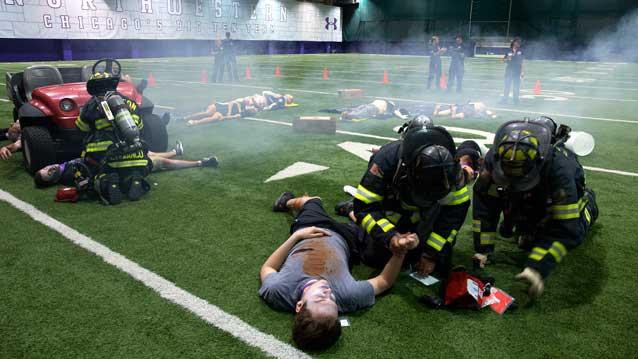EVANSTON - Emergency responders from Northwestern University, the north suburban area and Chicago, including a member of the FBI, gathered recently on the Evanston campus to participate in emergency preparedness drills involving hazardous materials in and around Welsh-Ryan Arena.
For the second consecutive year, the University hosted a series of practice drills, providing emergency personnel the chance to respond to simulated emergencies, so if a worst-case scenario should come to pass, the first responders will be better prepared.
“These are the individuals who get called first when something serious happens,” said Michael Blayney, executive director of Northwestern’s Office for Research Safety (ORS), as he passed bottled water out to local firefighters sweating inside full hazardous materials suits. “It’s our responsibility to ensure they have the opportunities they need to test their emergency response skills and build confidence in working with us through training.”
Drone footage taken during the training shows the scope of the exercises.
The practice drills -- with both accidental and intentional causes according to three scenarios devised by Northwestern ORS -- resulted in chemical contamination and injury to dozens of victims. The emergency responders had to assess each situation, determine what agencies needed to be alerted and identify victims and secondary threats, like fire, chemicals and broken glass.
The exercises spanned three days and included first responders from Northwestern, the North Shore Hazardous Materials Team and Division 3 of the Mutual Aid Box Alarm System (MABAS), which has a Hazardous Materials Response Team comprising emergency responders from more than a dozen North Shore fire departments.
“It is only through these types of ‘hands-on’ exercises that focus on the utilization of best practices and disciplined resource allocation that we can property prepare to save lives in the highly complex and dangerous environments that our agencies face all too often,” said Evanston Fire Department Deputy Chief Brian Scott.
A representative of the Chicago Office of the FBI also gave a presentation detailing the kinds of potentially dangerous materials that agents encounter in the field and consulted on various exercises.
“We have outstanding fire and police departments protecting the Northwestern community, Evanston and the surrounding communities,” Blayney said.


